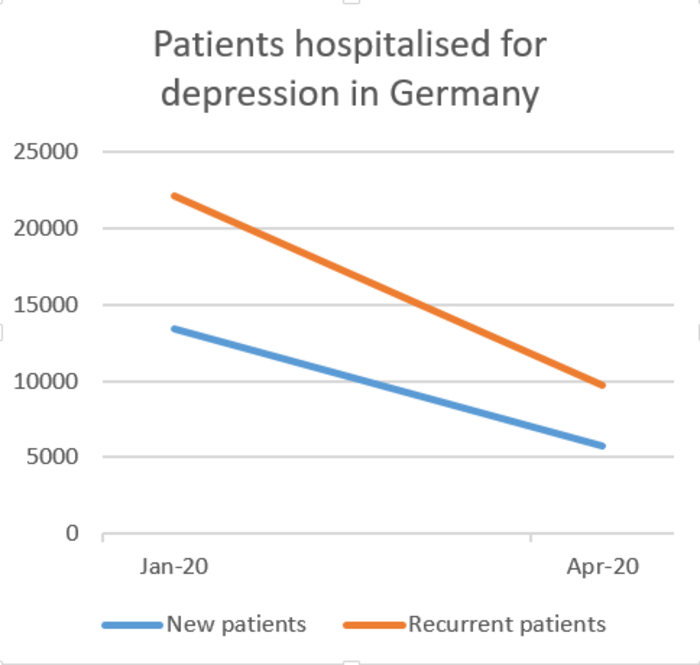In the first study of its kind, German researchers have shown that the COVID pandemic saw a huge drop in the number of patients being admitted to hospital for clinical depression. Independently of these national statistics, the researchers found that the number of outpatients they dealt with increased over the same period in their department. As inpatient treatment offers more intensive levels of care, this implies that many patients did not receive care appropriate to their condition. It is not yet known if this shift in treatment is also seen in other countries.

Credit: Mareike Aichholtzer
In the first study of its kind, German researchers have shown that the COVID pandemic saw a huge drop in the number of patients being admitted to hospital for clinical depression. Independently of these national statistics, the researchers found that the number of outpatients they dealt with increased over the same period in their department. As inpatient treatment offers more intensive levels of care, this implies that many patients did not receive care appropriate to their condition. It is not yet known if this shift in treatment is also seen in other countries.
The researchers, from the University Hospital in Frankfurt, looked at German national databases. They found that during the first COVID wave new hospitalisations for first time clinical depression dropped by 57.5%, from 13457 in January 2020 down to 5723 in April 2020. In the same period, the number of patients being hospitalised for recurrent depression dropped by 56.3%, from 22188 down to 9698.
Lead researcher, Dr Mareike Aichholzer said “We also saw a decrease in inpatient treatment of recurrent depression in our own hospital in Frankfurt. In addition to the stricter admission rules, this rather seemed to be due to a drop in demand from the patients themselves”.
In contrast, the number of new outpatients being treated for clinical depression at the University Hospital in Frankfurt remained stable and the number of patients with recurrent depression showed a significant increase between 2019 and 2021. However, Dr Aichholzer notes “This is data from a single centre, so we need to wait to see what other centres say”.
She continued, “The results indicate that patients who have repeatedly suffered from depression during their lives were less likely to be admitted to hospital during the pandemic. However, these patients are often so severely affected by depression that outpatient treatment alone is not sufficient to bring about a satisfactory improvement in symptoms. The result is that patients lose their quality of life in the long term. The actual reason for this observation is unclear. Although our study was not designed to identify the reasons for those changes, we however suspect that clinically depressed patients in particular withdraw more often from society/their friends/their family and that this behaviour was more common during the times of the lock-down and the strict hygiene guidelines. Moreover, we suspect, that clinically depressed patients avoided the hospital, because they were afraid of being infected with COVID-19 on the ward.
The data from our hospital in Frankfurt indicates that patients with clinical depression seem to have withdrawn themselves, rather than seeking adequate mental health help. To be prepared for the winter with potentially increasing COVID numbers, we have to provide easily accessible help and raise awareness for this topic”.
Clinical depression, also known as Major Depressive Disorder (MDD) is a serious mental illness, affecting more than 6% of Europeans at any one time. The majority of sufferers can be treated with pharmaceuticals and/or counselling, although a minority of patients don’t respond to treatment.
Commenting, Professor Brenda Penninx, Professor of psychiatric epidemiology at the Department of Psychiatry, University Medical Centre, Amsterdam, said:
“The figures found by the Frankfurt team confirm a familiar pattern. We have recently found that quite a few countries are beginning to report a decreased pattern of mental health care use during the first pandemic years. It is extremely important that in the next few years we follow whether postponed treatments may result in increased mental health problems. This also illustrates that mental health care deserves adequate clinical attention during future pandemics”.
This is an independent comment, Professor Penninx was not involved in this research.
Notes
Poster P.0127 Impact of covid-19 on German treatment numbers of patients with depression – a gap in care for the mentally ill? (researchers M. Aichholzer, C. Schiweck, C.Uckermark, T.Hamzehloiya, C.Reif-Leonhard, A. Reif, and S. Edwin Thanarajah) will be presented at the 35th European College of Neuropsychopharmacology annual conference, which takes place in Vienna and online from 15-18 October, see https://www.ecnp.eu/Congress2022/ECNPcongress. Up to 5000 delegates are expected to attend. The ECNP is Europe’s main organisation working in applied neuroscience.
Method of Research
Observational study
Subject of Research
People




